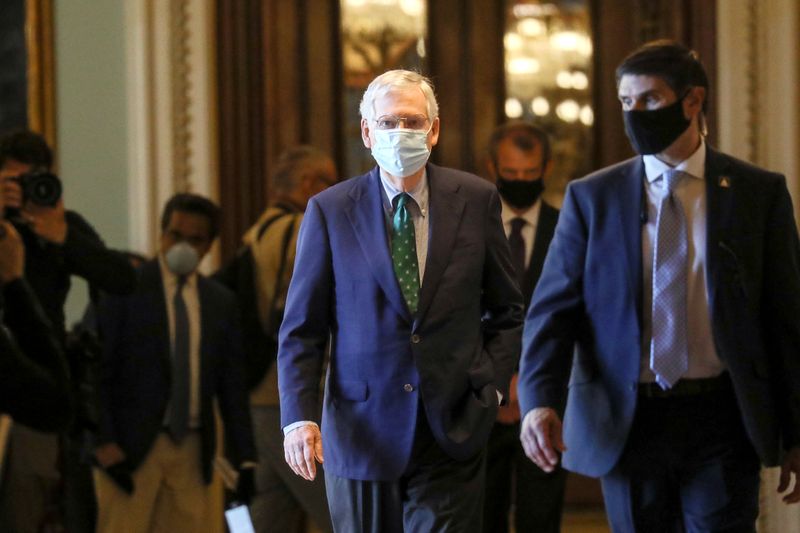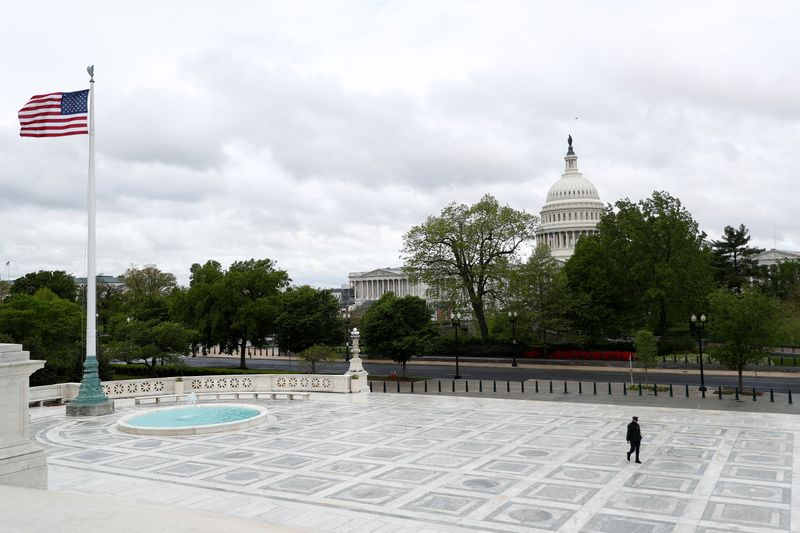By Patricia Zengerle and David Morgan
WASHINGTON (Reuters) - The U.S. Senate convened in Washington for the first time in nearly six weeks on Monday, despite concern it might put lawmakers and staff at risk of contracting the coronavirus, but made clear it could take weeks to pass any new relief legislation.
Party leaders raised partisan differences as soon as the Senate opened over the next step in how to combat the pandemic, nominations for senior government posts put forward by President Donald Trump and even the decision to return.
"If it's essential that the brave healthcare workers, grocery store workers, truck drivers and many other Americans continue to carefully show up for work, then it's essential that their U.S. senators carefully show up ourselves and support them," Republican Majority Leader Mitch McConnell said.
Senate Democratic Leader Chuck Schumer accused McConnell of calling senators back to pursue a Republican political agenda, not help the country.
"As we return to work under the cloud of crisis, Senate Republicans should concentrate on helping us recover from COVID-19, not confirming right-wing judges or protecting big businesses that threaten to put workers at serious risk," Schumer said.
Democrats and Republicans are at odds over the contents of any new coronavirus legislation. Democrats want up to $1 trillion to help state and local governments. Republicans are demanding liability protections for businesses, as a condition for moving forward on any bill.
Trump said during a Fox (NASDAQ:FOX) News town hall on Sunday that he would not consider any measure that did not include a payroll tax cut.
With Washington still under a stay-at-home order, lawmakers were advised by the congressional physician to wear masks, stay six feet (2 meters) apart and limit the number of staff on Capitol Hill.
Senators wore masks during their first vote on Monday evening, walking into the chamber only one or two at a time and raising their hands, mostly in medical gloves, to indicate their approval.
The Senate confirmed Robert Feitel as inspector general of the Nuclear Regulatory Commission by 87 to 0.
The Democratic-controlled House of Representatives chose to remain in recess this week because of potential health risks and has not announced when it will reconvene.
With some Democrats warning the Senate's return could risk spreading the virus, the Trump administration last week offered Congress 1,000 coronavirus tests.
McConnell and House Speaker Nancy Pelosi turned down the offer over the weekend, which drew fire from Trump.
"By Congress not wanting the special 5 minute testing apparatus, they are saying that they are not 'essential,'" Trump wrote on Twitter.
Kevin McCarthy, the top House Republican, also said he disagreed with the decision in an interview with Politico.

Senate committees scheduled nomination hearings on Tuesday, for Republican U.S. Representative John Ratcliffe as director of national intelligence and Brian Miller, a White House lawyer, tapped to oversee the Treasury's handling of coronavirus relief funding.
